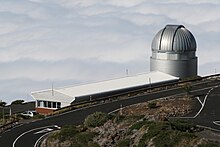Mercator Telescope

The Mercator Telescope as seen from the top of the Swedish Solar Telescope.
|
|
| Location(s) |
Roque de los Muchachos Observatory |
|---|---|
| Coordinates | 28°45′43″N 17°52′39″W / 28.7619°N 17.8775°WCoordinates: 28°45′43″N 17°52′39″W / 28.7619°N 17.8775°W |
| Organization |
Catholic University of Leuven |
| Telescope style |
telescope |
| Diameter | 1.2 m (3 ft 11 in) |
|
|
|
|
[]
|
|
The Mercator Telescope is a 1.2m telescope at the Observatorio del Roque de Los Muchachos on La Palma. It is operated by the Katholieke Universiteit Leuven (Leuven University), Belgium, in collaboration with the Observatory of the University of Geneva and named after Gerard Mercator, famous cartographer.
The telescope contains two different measuring devices. First of all, there is the MeropeII CCD camera. This camera has a size of 2k by 6k pixels Frame Transfer detector originally designed for ESA's canceled Eddington space mission. The filters used together with this camera are according to the so-called geneva photometric system. The second instrument on the Mercator Telescope is the HERMES echelle spectrograph. It covers a wavelength range between 380 and 875 nm with a spectral resolution of R∼85000.
The P7 photometer was active from May 2001 until July 2008. The photometer measured in the 7 band Geneva photometric system. It measured the star in one channel and the sky in another so that the sky can be subtracted. The filter wheel is turning at a rate of 4 Hz, changing between the filters of the photometric system.
The Swiss Euler 1.2m Telescope and the Mercator Telescope were part of the Southern Sky extrasolar Planet search Programme which has discovered numerous extrasolar planets. For other large telescopes of the period see List of largest optical telescopes in the 20th century.
The Hermes spectrograph was used to monitor the Star Delta Cephei in the 2010s. The data seemed to suggest a previously unknown stellar companion.
...
Wikipedia

